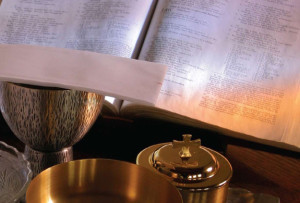A spirit of thanksgiving is a good thing. Most of us learned as children to say “thank you.” The culture used to support parents in such basic matters. But of the four types of prayer – adoration, contrition, thanksgiving, and supplication (ACTS) – explicit words of thanksgiving are rare in the liturgy. Since “Eucharist” means “thanksgiving,” and in view of the critical importance of expressions of thanksgiving, why the (apparent) imbalance?
Identifying the prayers of ACTS during the recitation of the Mass is a particularly useful spiritual exercise, and a good means of engaging in fruitful prayer.
The Mass begins with the Penitential Rite, the grand liturgical act of contrition for sins (“through my fault, through my fault, through my most grievous fault”) before we enter into the sacred mysteries.
We continue with the ancient prayer of adoration, the Gloria. After being instructed with the readings and homily, we proclaim our belief and dare to list our petitions (supplications) during the Prayers of the Faithful. The petitions continue in the Canon before and after the Consecration. And there are repeated expressions of our unworthiness throughout (“Lord I am not worthy…”). But distinct expressions of thanksgiving are few.
The first time we find ourselves giving thanks is during the Gloria. But even here the expression is more of an act of adoration: “We give you thanks for your great glory.” During the Preface we proclaim that it is “right and just” to give God thanks. Our thanksgiving takes the form of a duty connected to adoration. The priest pronounces the words of Christ before the Consecration – giving thanks to the Father – before the sacred words of institution.
From this bird’s-eye non-scholarly view, these pretty much exhaust the instances of explicit prayers of thanksgiving. Yet if “Eucharist” means “thanksgiving,” something seems amiss.
Perhaps a humble analogy from family life will help, without trivializing the splendor of the Mass. A mother delights in habitually polite children, children who frequently say “please” and “thank you.” But a mother would delight even more in children who especially honor her by being obedient to her. Indeed, a respectful and obedient child expresses a spirit of thankfulness, a spirit that need not be explicit.
The prayers of the Mass are designed to reveal and configure – by way of ritual — the right relationship between God and man. We are sinners and are unworthy in the presence of His Divine majesty and the liturgy repeatedly reminds us of that fact. Despite our relative insignificance, we dare to ask God for many spiritual gifts with the hopes – at times bordering on presumption – that He will lavish them upon us.
Above all we pray for communion with His most sacred Body, Blood, Soul, and Divinity. This provides us with a clue. While there are special “votive” Masses for specific temporal requests (good weather, good health, a happy death, etc.), in general the liturgy accents the spiritual gifts, gifts that cultivate our relationship with God, not the things of the world. They are the higher gifts because, they prepare us for eternity.
In the sacred liturgy, a spirit of thanks is communicated in prayers of adoration. In adoration we want to be with Him, despite our sinfulness. And prayers of praise and adoration recognize the right relationship between God and man. Simply put, God is God, and man – as God’s handiwork – belongs to God. Man is accountable to the authority of his Creator not only at death, but as he lives.
Perhaps this is, or should be, obvious. But if so why do we so frequently forget God’s authority in our daily lives? I speak less of our sinful failures committed in weakness, but the more pronounced tendency for us to “play God.”
We play God when we choose evil as the only alternative to doing something good: thinking it is good to lie to “prevent hard feelings”; redefining marriage according to contemporary sinful “alternative lifestyles”; procuring an abortion as necessary to prevent a “ruined career”; trafficking in aborted baby parts as a positive good in medical research; deliberately targeting civilians in war as “the only way to win.”
We play God with phrases that dismiss sinful behavior with “I’m sure God understands” or “I cannot judge.” There is nothing new in the temptation to play God. Adam and Eve were the first: “ye shall be as gods, knowing good and evil.” (Gen 3:5) In every sin of the intellect, there is shadow of the pride of Original Sin. Instead of accepting and being obedient to God’s commandments, we take matters into our own hands, with sinful audacity and malice of forethought – and presume to play God.
The ritual of the Mass is unrelenting – even pedantic – in reminding us where we really stand before God. The entire liturgy is designed to combat the Satanic temptation of pride as a condition (“thy will be done”) to receive the graces of Christ’s redemptive Sacrifice. The repetition in effect becomes, in totality, a kind of “holy cliché” of relationship and moral responsibility.
After years of Mass attendance, we begin to recognize our lowliness and dependence upon God alone; and in doing so we recognize that we are not insignificant, and we indeed count for something: “For God so loved the world that he gave his one and only Son, that whoever believes in him shall not perish but have eternal life.” (John 3:16) If so, who would dare “play God”?
Praising God for His great glory and vowing to do His will is indeed the expression of a vibrant spirit of thanksgiving. In a word, this is the meaning of Eucharist.















